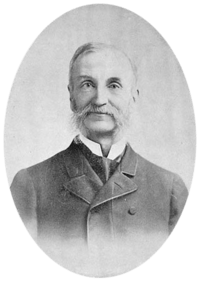Austin Abbott
| Austin Abbott | |
|---|---|
|
Austin Abbott | |
| Born | December 18, 1831 |
| Died | April 19, 1896 (aged 64) |
| Alma mater | New York University |
| Occupation | Lawyer |
| Parent(s) |
|
Austin Abbott, LL.D. (December 18, 1831 – April 19, 1896) was a lawyer and academic. He is probably best remembered as being the government counsel in the trial of Charles J. Guiteau for the assassination of President James Garfield.
Early life
On December 18, 1831, Abbott was born in Boston, Massachusetts. Abbott's father was Jacob Abbott.
Education
In 1851, Abbott graduated from New York University.
Career
In 1852, Abbott was admitted to the bar and became a partner with his brother Benjamin Vaughan Abbott in the legal firm Abbott Brothers, a firm he stayed with through 1870. He aided his brother Benjamin in the preparation of his well-known digests of laws and was himself a prolific legal author. His works, mostly of a practical character, included a comprehensive digest of New York Statutes and Reports, a treatise on Trial Practice, and a useful collection of legal forms, all of which proved to be useful to the profession. He married Ellen Louise Dummer Gilman in 1854. His second wife was since 1879 Anna Rowe Worth.
He assisted commissioners in preparing the codes of New York in 1865. In 1875, he gained a national reputation as counsel for Henry Ward Beecher in Theodore Tilton's suit against him.
In 1881, he took the case against Guiteau and won. The case was one of the first highly publicized uses of the insanity defense in the United States. From 1891 until his death he was Dean of the Law School of the New York University, and the professor of pleading, equity, and evidence there as well.
He wrote several books, including the novels:
- Cone Cut Corners; The Experiences of a Conservative Family in Fanatical Times, 1855
- Matthew Caraby, 1859 (with his brothers, including Benjamin Vaughan Abbott)
His non-fiction works include the following books, as well as several briefs and other legal writings:
- Reports of Practice Cases Determined in the Courts of the State of New York, Volume 1, 1855 (with his brother Benjamin Vaughan Abbott)
- Reports of Decisions of the Court of Appeals of New York, 1850-69, (4 volumes), 1873–1874
- New Cases, Courts of the State of New York, 31 volumes covering 1876-1894,
- Abbott's Digest of New York Statutes and Reports, new 6 volume edition, 1873
- Official Report of the Trial of Henry Ward Beecher, 2 volumes, 1875.
References
- Who Was Who in America:Historical Volume, 1607-1896. Chicago: Quincy Who's Who, 1967.
-
 This article incorporates text from a publication now in the public domain: Gilman, D. C.; Peck, H. T.; Colby, F. M., eds. (1905). "article name needed". New International Encyclopedia (1st ed.). New York: Dodd, Mead.
This article incorporates text from a publication now in the public domain: Gilman, D. C.; Peck, H. T.; Colby, F. M., eds. (1905). "article name needed". New International Encyclopedia (1st ed.). New York: Dodd, Mead.
External links
| Wikisource has original text related to this article: |
- Works by or about Austin Abbott at Internet Archive
- Appleton's Cyclopedia of American Biography, edited by James Grant Wilson, John Fiske and Stanley L. Klos. Six volumes, New York: D. Appleton and Company, 1887-1889
